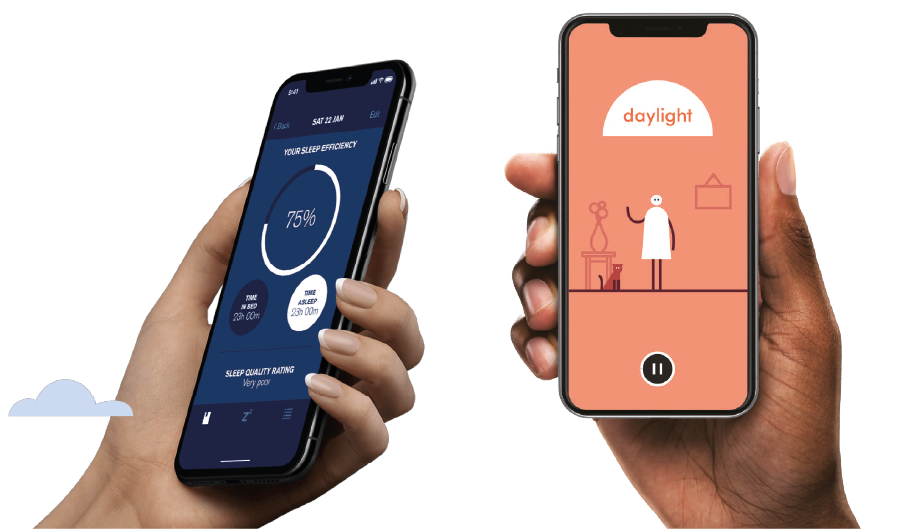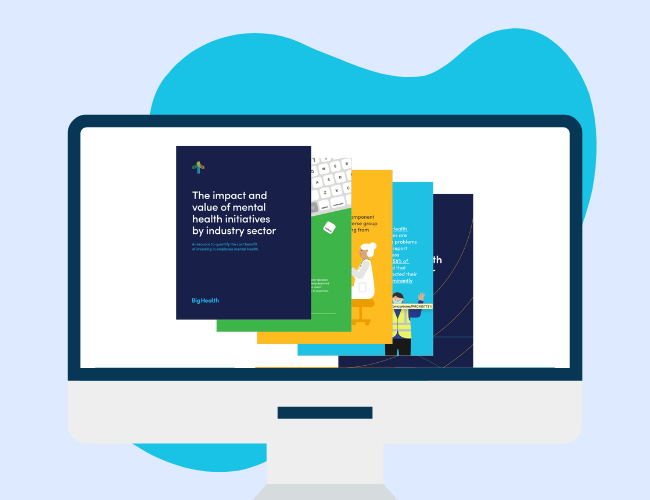How to Refer to Sleepio & Daylight
of Sleepio patients achieve clinical improvement in insomnia *
Randomised Control Trials (RCTs)
of Daylight patients achieve clinical improvement in anxiety **
Clinical Guideline Citations
Give patients the links below for instant access to clinically-proven CBT
Daylight (for anxiety): trydaylight.com/nhs
Sleepio (for insomnia): sleepio.com/nhs
Mental healthcare for all, with instant access
Sleepio®, for poor sleep and insomnia, addresses unique needs with a personalised program, featuring sessions with step-by-step guidance through evidence-based techniques, available night or day. In a UK clinical trial, 76% of patients experienced improvement in their sleep1.
Daylight®, for worry and anxiety, helps people gain control over their anxiety with personalised therapeutic content. It’s available when it’s needed the most, providing patients with evidence-based techniques to cope in the moment. In a clinical trial, 71% of patients experienced reductions in anxiety2.

We are pleased to launch these treatments nationwide, providing clinically validated solutions for those who need it most.
Mental Health and Social Care Minister, Scotland
How does it work?
Primary care organisations use Daylight and Sleepio to help the one in three patients they see with common mental health problems. Following either self-referral or clinical referral, patients are able to instantly access treatment via their desktop computer or mobile device.
An effective way to meet patient and system needs
Daylight (CBT for anxiety) and Sleepio (CBT for insomnia) provide you with:
- Gold standard treatment
- In-year cost savings
- Easy implementation
- Workforce support
- Meet patient demand without hiring
- Improve outcomes and save money
- Save clinician time
We're trusted by the NHS because we take evidence seriously.
Learn more about our industry-leading commitment to research:
CPD Accredited training and referral materials
Watch our CPD accredited training video with clinical expert Dr. Dimitri Gavriloff
Hear our patients' stories
Hear how Daylight and Sleepio have impacted Ceryis and Imran's lives
Sign up for the latest updates direct to your inbox
1. ‘Improvement in sleep’ defined as 80% or more of total time in bed being spent asleep at the end of the clinical trial. Espie, C. A., Kyle, S. D., Williams, C., Ong, J. C., Douglas, N. J., Hames, P., & Brown, J. S. (2012). A randomized, placebo-controlled trial of online cognitive behavioral therapy for chronic insomnia disorder delivered via an automated media-rich web application. Sleep, 35(6), 769-781. *
2. Probable clinical diagnosis of anxiety defined as reporting levels of anxiety below the threshold for a clinical diagnosis of anxiety at a follow-up point 10 weeks after the start of treatment. Carl, J. R., Miller, C. B., Henry, A. L., Davis, M. L., Stott, R., Smits, J. A., … & Espie, C. A. (2020). Efficacy of digital cognitive behavioral therapy for moderate-to-severe symptoms of generalized anxiety disorder: A randomized controlled trial. Depression and Anxiety, 37(12), 1168-1178 **




